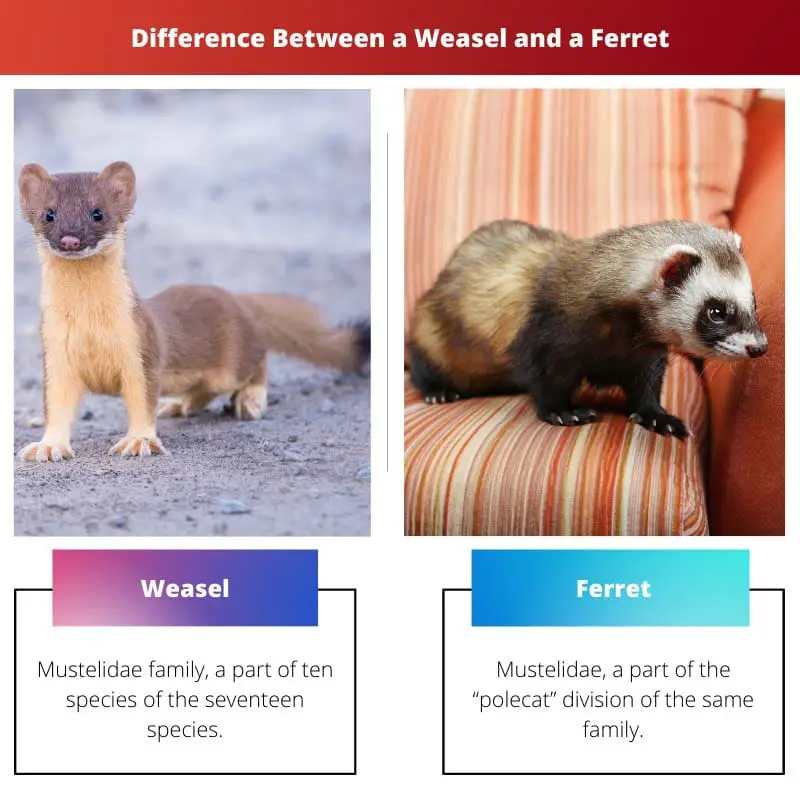Weasels and Ferrets are small animals that belong to the same family.
They differ from each other in terms of tail size, whether they are nocturnal or diurnal animals, overall body size, body appearance and colour, and domestication procedures, among other things.
Key Takeaways
- Weasels are small, wild carnivorous mammals, while ferrets are domesticated descendants of the European polecat.
- Ferrets have a more uniform, elongated body shape, while weasels have slimmer, more tapered bodies.
- Weasels are native to various habitats worldwide, while ferrets are kept as pets and used for hunting.
Weasel vs Ferret
A weasel is a small carnivorous mammal with a long, slender body. Weasels are wild animals that are known for their aggressive hunting behaviour. A ferret is a domestic animal that has been bred for its friendly and playful nature. Ferrets have been domesticated and are commonly kept as pets.

Weasels are more akin to diurnal creatures, as they are most active during the day. They’re also loners. The taming of weasels is quite difficult. They are characterised by a high level of aggression.
As a result, they are uncommon as pets. Because of their aggressive behaviour, the domestication of weasels is prohibited in some states. Red-brown-coloured weasels can be found. Their underside, on the other hand, is white.
Ferrets tend to congregate in packs. They are referred to as “nocturnal animals” since they are more active at night. Ferrets have been valuable companions to humans for over two thousand years.
Ferrets are widely domesticated and popular around the world. Ferrets are mostly black or brown. Their bodies, however, have a white hue to them.
Comparison Table
| Parameters of Comparison | Weasel | Ferret |
|---|---|---|
| Family | Mustelidae family, a part of ten species of the seventeen species. | Mustelidae, a part of the “polecat” division of the same family. |
| Overall body Growth | Shorter creatures (18-20 inches) | Longer creatures (24-26 inches) |
| Size of Tail | Longer Tails (13 inches) | Shorter tails (5 inches) |
| Feed on | Birds, rats, mice, etc | Rabbits, birds, snakes, rats, mice, etc |
| Nocturnal/Diurnal | Active in the daytime. | More active at the nighttime. |
| Domestication | Domestication is restricted. | Great companions of human beings. |
| Body colour/appearance | Red-brown coloured shades, with a white underbelly. | Black and brown appearance, with the white mix. |
What is a Weasel?
Mustelidae is a family of weasels. They do, however, belong to 10 of the seventeen species in the same family. Ferrets are larger than weasels, while weasels are smaller.
Weasels, on the other hand, are lengthy creatures that can reach a length of eighteen to twenty inches.
The tails of weasels are longer than those of ferrets. Weasels’ tails are normally between thirteen and fourteen inches long. Weasels eat other small animals, such as birds, rats, mice, and other rodents, to survive in the environment.
Weasels are more like Diurnal species because they are most active during the day. They are also solitary creatures.
Weasels are notoriously difficult to control. They have very aggressive personalities. As a result, they are rarely kept as pets. Weasels are not allowed to be domesticated in several states due to their aggressive nature.
Weasels can be identified by their red-brown colouration. They do, however, have a white underbelly.

What is a Ferret?
Ferrets are members of the Mustelidae family. However, they belong to the “polecat” division of the same family. Ferrets are long creatures in their own right.
These creatures have thick fur and can grow up to twenty-four to twenty-six inches in length. Weasels have longer tails than ferrets.
Ferrets have tails that are normally approximately five inches long. Ferrets eat rabbits, birds, snakes, rats, mice, and other small mammals to survive in the environment.
Ferrets are seen in groups. They are dubbed “nocturnal animals” because they are more active at night.
Ferrets have been terrific companions to humans for over two thousand years. Ferret domestication is prevalent all around the world.
Ferrets come in a variety of colours, ranging from black to brown. They do, however, have a tint of white mixed in with their body colour.

Main Differences Between a Weasel and a Ferret
- Weasels belong to the Mustelidae family. However, they are a part of ten species of the seventeen species of the same family. On the other hand, A Ferret belongs to the family of Mustelidae, but Ferrets are a part of the “polecat” division of the same family.
- Weasels are comparatively shorter creatures than Ferrets. However, Weasels are long creatures and grow up to eighteen to twenty inches. On the other hand, Ferrets are themselves long creatures. These animals possess thick fur and grow longer, up to twenty-four to twenty-six inches.
- Weasels possess tails that are longer than Ferrets. The size of the tails possessed by Weasels ranges about thirteen inches. On the other hand, Ferrets possess shorter tails than Weasels. The size of the tails possessed by Ferrets ranges from about five inches.
- Weasels feed on other small creatures, such as birds, rats, mice, etc., for their survival in the ecosystem. On the other hand, Ferrets feed on rabbits, birds, snakes, rats, mice, etc., for their survival in the ecosystem.
- Weasels are more like Diurnal creatures, as they are active in the daytime under sunlight. They are solitary creatures as well. On the other hand, Ferrets can be spotted in groups. However, they are more active at night, hence are called “nocturnal animals”.
- Weasels are very hard to be tamed. They are highly aggressive in characteristics. Hence they are not kept as pets. The domestication of Weasels is restricted in certain states due to the aggressive behaviour of these small creatures. On the other hand, for two thousand years, Ferrets have served as great companions of human beings. The domestication of Ferrets is quite common and popular worldwide.
- Weasels can be spotted in Red-brown coloured shades. However, they also possess a white underbelly. On the other hand, Ferrets appear in the colour range of Black and brown appearance. However, they also have a tint of white mixed in their body colour as well.

- https://academic.oup.com/mbe/article-abstract/29/10/2905/1030692
- https://zoolstud.sinica.edu.tw/Journals/38.4/443.pdf

The article is very detail-oriented, I really enjoyed it
I truly agree, the comprehensive details and comparison table make the article an exceptional source of knowledge about weasels and ferrets.
The article provides an informative comparison of the key differences between weasels and ferrets, highlighting the varied characteristics of each member of the Mustelidae family. The details and comparison table are very helpful for understanding the distinctions.
Absolutely! The article does a great job of educating readers on the specifics of distinguishing between the two species, making it clear for those unfamiliar with these small animals. Well done!
Very comprehensive and well-detailed information. It’s a good resource for anyone looking to learn more about weasels and ferrets, especially those interested in understanding their differences.
Very thorough examination of differences between weasels and ferrets. The comparison table is an excellent addition, providing an easy-to-understand summary of the distinctions.
The content is presented in an organized, educational manner, offering an excellent overview of the distinctive attributes of weasels and ferrets. It’s both engaging and enlightening to read.
Absolutely agree! The article’s well-structured content, supplemented by the comparison table, makes it a compelling read for those interested in understanding the differences between weasels and ferrets.
The content provides a fascinating insight into the differences between weasels and ferrets, offering an educational and engaging perspective for audiences to understand the unique aspects of these small animals.
Absolutely, the detailed descriptions provide a valuable understanding of the distinctions between weasels and ferrets, resulting in an informative piece for readers.
A truly enlightening post! The in-depth analysis and comprehensive approach to comparing weasels and ferrets make it a source of valuable information for those looking to expand their knowledge on the topic.
The article presents a thorough comparison, shedding light on the unique attributes of weasels and ferrets, offering insightful details on their distinct habits, domestication, and body features.
Certainly! The detailed description of the characteristics of weasels and ferrets contributes to a greater understanding of each animal. The comprehensive nature of the content is quite impressive, educating readers on the differences between these small creatures.
The post is very informative, I liked it
The article does a brilliant job of dissecting the characteristics and differences between weasels and ferrets. The comparison table alongside the detailed descriptions makes it an essential read for anyone fascinated by these animals.
Absolutely! The in-depth analysis of the unique traits of weasels and ferrets provides valuable insights into the attributes that set them apart. It’s a well-structured piece that delves into the specifics effectively.